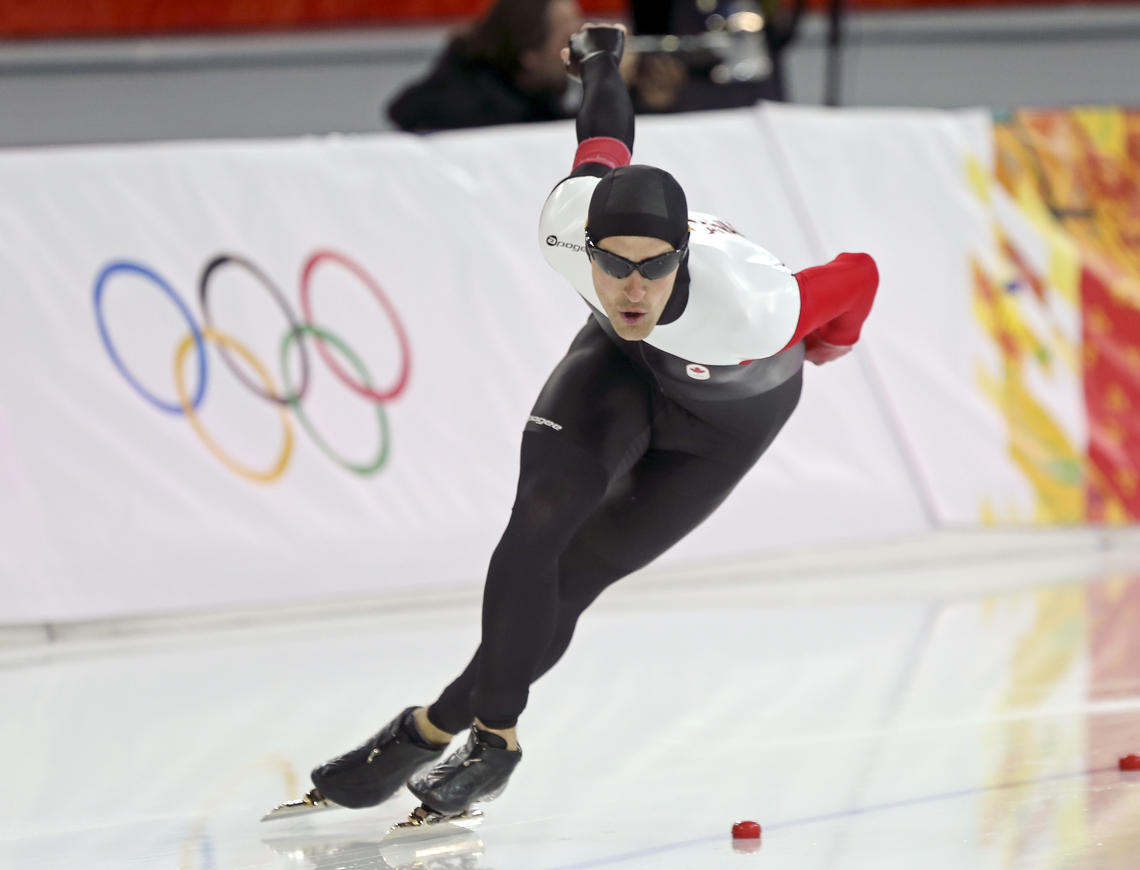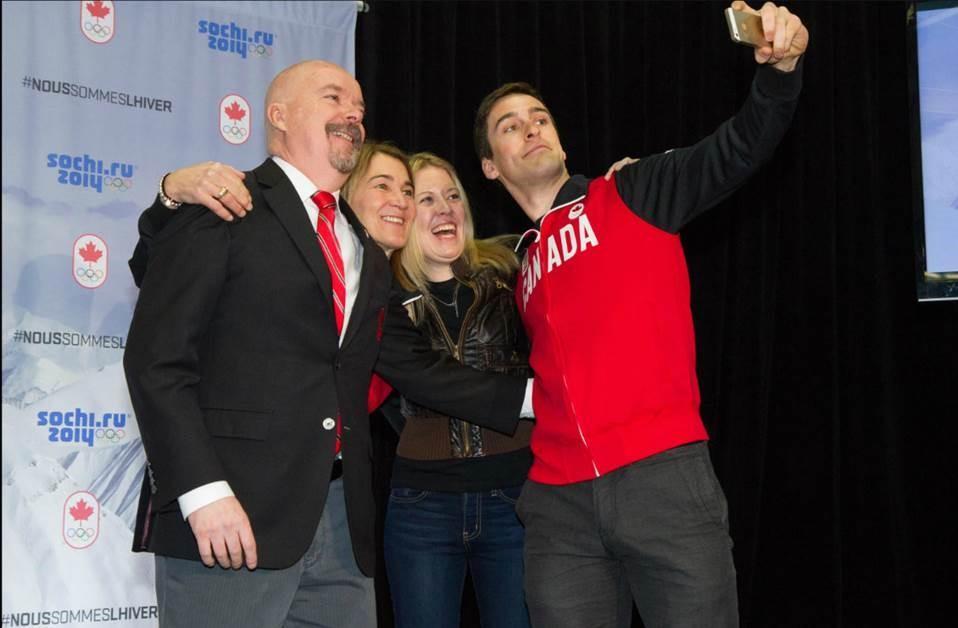Feb. 12, 2018
Denny Morrison overcomes career-threatening injuries to compete in fourth Olympics

Long track speedskater Denny Morrison's 1,500m race at the Sochi Olympics earned him a bronze medal.
Mike Ridewood
In Denny Morrison’s darkest hour, it was the hiccups that nearly broke him. Lying in a hospital bed in the dead of night, he awoke — alone, disoriented and bewildered — wholly unaware of why he was there. The pain from the hiccups was so intense, Morrison wasn’t sure he could bear even one more.
“I remember thinking that I would rather die than have another hiccup,” he recalls. Mercifully, they eventually stopped, and for Morrison that sweet second became ground zero for his long journey back to health, and back to the podium.
Until then, the four-time Olympic medallist in speedskating had enjoyed his best season ever in 2015, winning an overall World Cup title and World Championship in the 1,500m. But life changed in an instant when he was in a serious motorcycle accident the following summer that resulted in a broken femur, torn ACL, punctured lung, concussion, internal kidney and liver damage, broken elbow, and broken spine.
Mere mortals would have been happy just to walk again, but in that pivotal moment when the hiccups stopped, Morrison decided he was going to make it back to the Games. He broke everything down into tiny goals and attacked each with a stunning degree of resolve. “I had to take a step back and say, bones heal, ligaments heal. It was just about assessing the damage and deciding that this won’t stop me.”
Deep appreciation for simple ability to bike and skate again
In a few short months, Morrison, who is a former UCalgary natural sciences student, was back to very light training. At first it was the bike that gave him wings, and then when he stepped back onto the ice he felt as though he could fly. “It was amazing,” he marvels. “I had tears in my eyes, what a feeling it was.”
Throughout this recovery, Morrison developed a deep appreciation for the simple ability to ride a bike and skate again. “There were levels of gratitude I’ve never experience before,” he says. “It just made me grateful for every step along the way, I have a different appreciation now for the sport I’ve done for most of my life.”
After returning from the motorcycle crash, Morrison and his girlfriend, now wife Josie Spence Morrison, embarked on a bike-packing adventure in the spring of 2016 — riding 1,000 kilometres of the Arizona Trail through rough terrain and harsh conditions.
Significant setback ultimately inspired Morrison
Two days after they completed the ride, tragedy struck again. While out eating a celebratory meal, Morrison began slurring his words, his face drooped and he couldn’t put his arm into his jacket sleeve. Josie, who is trained in first aid as a lifeguard, noticed the signs immediately and took him to the hospital where an MRI confirmed that he had suffered an ischemic stroke. Her swift action saved his life.
That trip was supposed to be the pinnacle of Morrison’s recovery, a statement to himself, and the world, that ‘Yes, I’m back and I can do this.’ Instead, after a year-long battle to regain his health, he was back at square one.
“I had to ask myself what I was doing,” he admits. “The summer before when I was recovering from the motorbike accident was so hard.” But shortly after his stroke, he found a reason. He attended an event for the Heart and Stroke Foundation where he met stroke survivors and witnessed the struggle they endured just to regain basic day-to-day functioning."

Morrison poses for a selfie with, from left: Gene Edworthy; France St-Louis and Michelle Rempel.
Riley Brandt, University of Calgary
“Seeing that brought me back to the power of sport,” he says. “It really inspired me.” He says that having spoken about grit and determination for his whole career, it was now time to walk the walk, not just talk the talk. The question was no longer ‘Why am I doing this?’ but rather, “Why wouldn’t I?”
So, he began again, this time limited by the risk of over-exerting himself. It took several months before he was able, both physically and mentally, to push hard enough to reach his maximum heart rate. And now, here he is, embarking on his fourth Olympics, with a recent World Cup gold in the team pursuit and one impressive fifth in the 1,500m.
Recovery defies all odds
The physical capacity of his body to heal is almost superhuman, but it’s Morrison’s mental strength and self-described ‘grittiness’ that make him unbreakable. That doggedness is now what people have come to expect from Morrison.
“I have seen Denny recover before from a broken leg before Sochi, and he healed faster than all medical predictions,” remembers Bart Schouten, Morrison’s coach for the last eight years. “But to see him come back from this major motorcycle accident and the stroke defies all odds. And at the same time, I have always had the belief that if anybody could come back from this, it would be Denny.”
At the 2010 Games, after performing below his expectations, the younger, less mature Morrison lashed out in anger to the press, pointing fingers instead of looking inwards. “I was angry for the wrong reasons,” he now admits. “Like seeing only what I didn’t have.” In the years since, he has evolved throughout his recovery and undergone a major personal transformation as a result.
“As a skater, he is no longer a stereotypical, egocentric athlete,” says Schouten. “He’s a better teammate, better team captain and wants to win a medal to give back to the people who helped him during his comeback.”
He’s become a voracious reader, too, learning all about neuroscience and philosophy. “Now I’m thankful for the right reasons,” Morrison says.
Morrison balances intensity, competitiveness with gratitude
Listening to Morrison tell his story now, you can tell he’s told it many times before. Indeed, he has quite a story to tell, but it’s not just platitudes he serves up. Rather, it’s an incredibly honest reflection on what he’s overcome, and who he’s become, in the years leading into Pyeongchang.
Despite his evolution, Morrison maintains that he is still extremely intense and competitive, he’s just gained a profound sense of gratitude for what he does, and the team around him, that wasn’t there before.
“I see that every step I take since the crash and the stroke is a victory, not just for me, but for my team too.” Still, he adds, “In Pyeongchang I want to win, I don’t want to set any limits to what is possible.”
Kristina Groves, BSc’04, MSc’15, is a four-time Olympic speedskating medallist. She currently works as a sustainable energy consultant, freelance writer, and TV analyst for CBC Sports.
